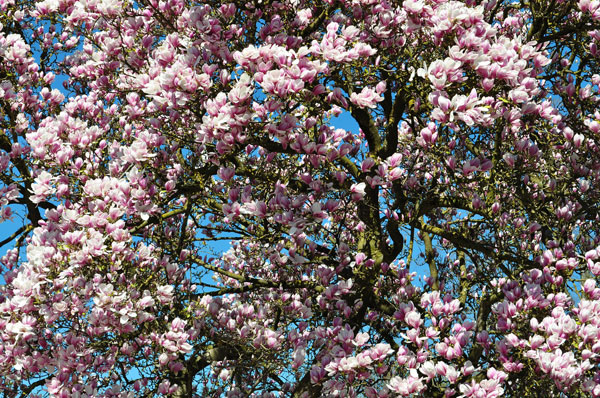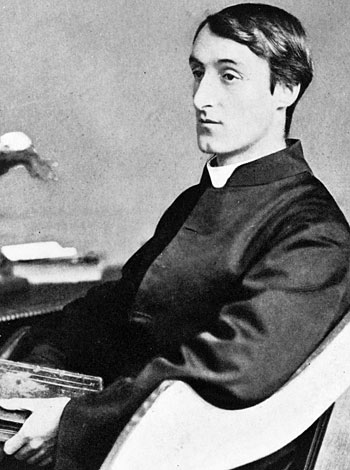September 24, 2018
Mercy Day
Poems on Spring are quite common, but the glory of this Hopkins poem is in the way in which his imagery and language is not just descriptive: it also attempts to bring about in us the awakening of spring.

The poem was written during a Whitsun holiday weekend, May 1877, while out walking near St Beuno’s in N. Wales. Hopkins can be anguished and self-questioning at times, but when he is out in the landscape he seems released from self. He is looking, touching, tasting, recording and sketching what he sees. An observant scientist and a passionate one. He exhorts us to be in the environment with our whole feeling selves and to let its beauty come to us:
SPRING
Nothing is so beautiful as Spring –
When weeds in wheels shoot long and lovely and lush;
Thrush’s eggs look little low heavens, and thrush
Through the echoing timber does so rinse and wring
The ear, it strikes like lightnings to hear him sing;
The glassy peartree leaves and blooms, they brush
The descending blue; that blue is all in a rush
With richness; the racing lambs too have fair their fling.
What is all this juice and all this joy?
A strain of the earth’s sweet being in the beginning
In Eden garden, - Have, get, before it cloy,
Before it cloud, Christ, lord, and sour with sinning.
Innocent mind and Mayday in girl and boy,
Most, O maid’s child, thy choice and worthy the winning.
Spring, he says, is the yearly time of awakening. Like a bell, the season rings us out of the sluggishness of winter. Even the lowly weeds have a part to play They cluster in wheels and their growth is everywhere, shooting up long and lovely and lush. We caress with tongue the three wheeling ‘l’ sounds of long and lovely and lush. We find our ears are pierced by the vibrating ‘ing’ sounds of the thrush. They rinse the mind of the winter memories and the residue that keeps us from participating in the growth that is everywhere. . In fact these sounds wring us – a favourite word of the poet which he uses in a spiritual sense of his relation to God. For example, in his long Deutschland, he beseeches the Master God to wring thy rebel, We actually feel in the body the stretching, the push and pull of Spring. And though the pressure of spring can be harsh, it is also consoling. Hopkins here draws on what is a favourite colour of his, ‘blue’ which suggest the heavens. Here he invokes the ‘blueness’ to suggest that that theavens are opening its light to us after the darkness of winter. Nature knows this, even the lowly racing lambs, tell us we have turned a corner and we can rejoice.
 In the last six lines (the sextet), Hopkins goes deeper and asks what is it all about? What is this juice, this joy; what, asks the poet, with his musical ear, is this strain we hear playing in the universe? And his answer invites us to another level. In spring, he says we are reminded of the original grace of our creation, of how God intends us to be. And so he asks us to trust one again that original ‘strain’ of grace that becomes muted in the deviousness of adult living. We recognise it in the innocence in the eyes of children. Hopkins, like many poets and creative people love the child’s mind The child in all of us is the storehouse for the purity and asceticism of creativity. But possibly another reason for his focus on the child is the words of Jesus to his disciples:. He called a little child to him and set the child in front of them. The he said, ‘I tell you solemnly. Unless you change and become like little children you will never enter the kingdom of heaven.’
In the last six lines (the sextet), Hopkins goes deeper and asks what is it all about? What is this juice, this joy; what, asks the poet, with his musical ear, is this strain we hear playing in the universe? And his answer invites us to another level. In spring, he says we are reminded of the original grace of our creation, of how God intends us to be. And so he asks us to trust one again that original ‘strain’ of grace that becomes muted in the deviousness of adult living. We recognise it in the innocence in the eyes of children. Hopkins, like many poets and creative people love the child’s mind The child in all of us is the storehouse for the purity and asceticism of creativity. But possibly another reason for his focus on the child is the words of Jesus to his disciples:. He called a little child to him and set the child in front of them. The he said, ‘I tell you solemnly. Unless you change and become like little children you will never enter the kingdom of heaven.’
In this last stanza, however, the poet goes on to acknowledge that the enormity of the task of retaining our original grace or acquiring the mind of the kingdom It is too great for humans. And as Hopkins can be about what he considers important, he is quite matter-of-fact and gives a command.. He calls on Christ lord, maid’s child to do the task, to get us, as he says, to keep the spring-time of our original creation alive in us, because on our own and apart from Him, we sour with sinning.
Messages to: Jo O'Donovan rsm
Poetry commentary by Sr Jo previously published on mercyworld.org:
*Travelling through the Dark by William Stafford
* 'Men Go To God' by Dietrich Bonhoeffer
* 'Advent' by Patrick Kavanagh
* 'This Above All is Precious and Remarkable' by John Wain
* 'Spring and Fall: To a Young Child' by GM Hopkins sj
For those who would like to hear Spring read aloud:
Image: Gerard Manley Hopkins. Wikimedia Commons. Public Domain